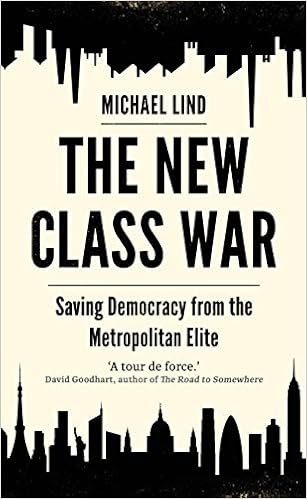 |
| Amazon link |
I read this with great interest, despite Michael Lind's stodgy writing style. I broadly agree with Gerard Baker's review in The Times:
"The construct favoured by Lind to place populism in context is familiar: class. He argues that our present political strife is a successor to the industrial-based class war that began more than a century and a half ago with the emergence of modern capitalism. The new class war, he says, is between a disempowered and disdained working class that still reveres traditional values, and a technocratic managerial elite, steeped in progressive liberal values. “The current regime of technocratic neoliberalism” is, he writes, “a synthesis of the free market economic liberalism of the libertarian right and the cultural liberalism of the bohemian/academic left.”
After the Second World War, Lind argues, western governments, determined to avoid a return to the Great Depression, brokered a social compact between the new managerial capitalist elites and trade unions. The result was a kind of harmonious suspension of the class war predicted by Marxists, and the rapid growth in living standards was widely shared.
At the end of the Cold War, however, multinational corporations, building efficient global supply chains, shattered that compact, disempowering unions and workers and transferring political power from national legislatures to executive agencies, transnational bureaucracies and national and international judiciaries.
To those who doubt that the new globalist managerial elite really is a class, Lind cites the stark decline of social mobility in the US and to a lesser extent in Europe in the past 30 years. The new managerial and professional “overclass”, as he calls them, stop at nothing to get their children into elite universities to perpetuate their supremacy — and they succeed.
He notes that the chief trait predicting support for Brexit or for Trump in 2016 was lower educational qualifications, but rather than asserting, as some have, that this is proof that populism is the product of ignorance or stupidity, he argues that “the possession of a diploma tends to indicate birth into the economic elite”, suggestive of a “conflict among largely hereditary social classes”.
The geography of this new class war is another defining feature. Rather than the conventional urban versus rural taxonomy, Lind prefers “hubs and heartlands”. Elites live in hubs that tend to be the more luxurious quarters of big metropolises, while the working class live in small towns and exurbs (areas outside dense suburbs).
Lind points out that “to members of the overclass accustomed to thinking of geographic mobility in the interest of a professional career as the norm, it may come as a shock to learn that . . . 57 per cent of Americans have never lived outside their home states and 37 per cent have spent their entire lives in their home towns, with the exception of periods of military service or college education”.
Geography is key, he says, to understanding modern political tensions over the great cleavages of populist politics: trade, immigration and environmental protection. If you live in comfortable metropolitan enclaves, your view of cheap products easily acquired through free trade will be different from those who live in manufacturing-heavy areas where jobs have been displaced by trade.
If your experience of immigration is an army of nannies, plumbers and baristas servicing your needs, you will see it differently from those in the heartland whose wages are constrained by those same immigrants. Saving the planet similarly takes on a different practical meaning from the vantage point of a stylish loft in some cool urban district than if you live on top of valuable mineral resources.
Lind notes that these differing economic and social attitudes have brought about a radical transformation of our political institutions, especially parties. Labour and the Democrats in America have become the parties of affluent white metropolitan elites allied with ethnic minorities. Conservatives and Republicans are increasingly the parties of white working-class voters in the heartlands.
Lind is not a fan of populism (“Populism is a symptom of a sick body politic, not a cure,” he says), which he believes is already having dangerous effects on political culture and national cohesion. The threat, he says, is not of fascism, but of chaotic, divisive and increasingly corrupt systems. Less Weimar Republic, more banana republic.
To confront and defuse populism he calls for a renewal of “democratic pluralism”, power-sharing arrangements among the elite and the governed, through, for example, some restoration of union power. More controversially, he argues for the promotion of the “developmental state” that sponsors technological innovation and promotes industries. “The experience of contemporary East Asian democracies — Japan, South Korea and Taiwan — proves that neoliberalism is not the only model for a high-tech modern democracy,” Lind argues.
Lind’s diagnosis is sharp and insightful, his prescriptions less so. What does “democratic pluralism” mean in practice? Should we really return to an era when great trade unions held managements to ransom? In an age of automation is that even possible? Is the “developmental state” merely autarky, a closed economy?"
To get a feel for where Lind is coming from you could read his insightful piece in 'The Bellows' entitled "The Double Horseshoe Theory of Class Politics".
